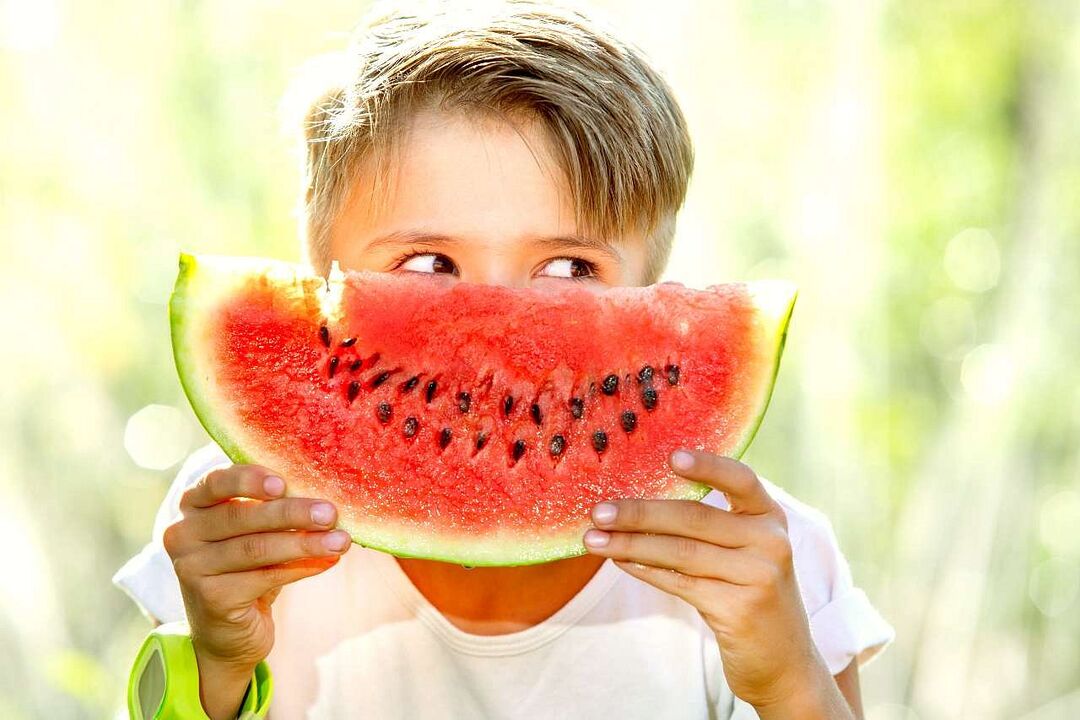The advantages of a watermelon can hardly be overestimated, especially in the heat, if it is chosen correctly. Otherwise, watermelon can harm the health of children and adults. How can watermelon be harmful and beneficial? And who shouldn't eat this summer berry?
Berry or pumpkin?
Traditionally, watermelon is considered a berry, the largest and juiciest, but still some biologists argue. Some call it a fake berry, others call it a pumpkin. And there is no complete understanding.

The home of watermelons is Africa, so heat is needed for these berries to grow normally. Wild watermelons, which bear little resemblance to cultivated plants, still grow on the territory of Africa. Previously, the flesh of watermelons was pale pink, and the usual red-fleshed berries did not appear until the late 20th century.
This valuable berry was known in ancient times. Watermelon seeds have been found in the tombs of the pharaohs, and references to this juicy berry can be found on the murals. Only in the 10th century did this berry spread to China, and on the territory of Russia it appeared only in the 13th century. -XIV. Century on. These berries were grown in many countries around the world, and festivals are still often held and even monuments are erected. This is not surprising, because the fruits have a unique sweet taste, have a whole range of useful properties, are used in traditional medicine, not to mention the possibility of using them in cooking and in the art of carving.
What else are watermelons useful for?
- 90% watermelon is made up of water, which is why they are so useful in the heat as they quench your thirst. And its sweet taste is so popular with children, it perfectly replaces sweet lemonade and juices. Watermelons contain practically no protein or fat, but they contain a lot of carbohydrates, which provide energy.
- Adults with intensive workouts, children playing outside, a piece of watermelon or a small smoothie quickly replenish their water reserves and provide energy for further success.
- Watermelon is a valuable source of lycopene, a pigment and a precursor to vitamin A, but during biochemical processes it does not become a vitamin but continues to act as an antioxidant. Lycopene neutralizes the effects of free radicals, which helps curb aging and more.
- The pulp of watermelon contains a large amount of folic acid, which is very important for the reproductive health of both men and women, especially during the planning phase of pregnancy. This acid is also very important for the condition of the skin. Folic acid is very useful for children, as it is necessary for the development and maturation of the nervous system.
- Because of the high concentration of magnesium, watermelons are very useful for patients suffering from diseases of the cardiovascular system. This element improves the functioning of nerve and muscle fibers and is particularly recommended for patients prone to stress and depression.
- The pulp of watermelon also contains citrulline - a substance that promotes the expansion of blood vessels and increases libido. Hence, watermelons are recommended for men to improve their intimate life.
- Watermelons have a pronounced diuretic effect, that is, they help eliminate excess fluid. But this is not just "water", watermelons give a feeling of satiety, so the popularity of the watermelon diet increases in August, September.
- Watermelon seeds are even healthier and more valuable than pulp. They have a high concentration of folic acid and niacin, magnesium. But these seeds are best eaten dry.
Watermelons and medicine
Traditional medicine only uses seeds as the raw material for medicinal oils, from which the oil extract is obtained. Because of its diuretic properties, this oil can be recommended to patients to help remove sand from the kidneys. But you need to first consult a doctor, taking into account the indications and contraindications, as well as possible side effects.
The pulp and rind are used by alternative medicine in many countries. According to some concepts, watermelons relieve edema, resist high blood pressure, prevent constipation, etc. In Chinese medicine, watermelon is believed to remove all diseases from the body and stimulate skin regeneration.
How can watermelon be harmful?
As mentioned earlier, watermelon is a mix of water and quick carbohydrates. But despite the low calorie content, overeating can raise the glycemic index, which is not very good for those with diabetes and prediabetes diseases.
The fact is that the body is forced to use a lot of water to remove sugar, and watermelon itself has a diuretic effect. And contrary to popular belief, with the help of watermelons it is not "waste products and toxins" that are removed, but minerals.
Another side effect associated with a diuretic effect is the provocation of stones. Therefore, watermelon should be limited to people suffering from urolithiasis.
Watermelon is not recommended for children under 3 and it is all about the composition of the pulp. Watermelon is not an allergenic product, but nitrates are often found in its composition. An adult organism can cope with them well, but that of a child cannot. By the way, for the same reason, adults are not recommended to eat watermelon to the crust, where pollutants are concentrated.
Well, the main danger from watermelons is poisoning, which is very difficult to treat. And the reason is only nitrates and pesticides, which can cause severe and severe poisoning, and the first signs appear after 1-2 hours. Therefore, it is not recommended to buy watermelons before August. However, if it is an early ripening fruit, you will need to ask the sellers for a safety certificate. This is the only way to avoid poisoning.
Large numbers of microbes can accumulate on the surface of watermelons during transportation and storage. And before you cut the watermelon, it must be thoroughly rinsed under running water.













































































